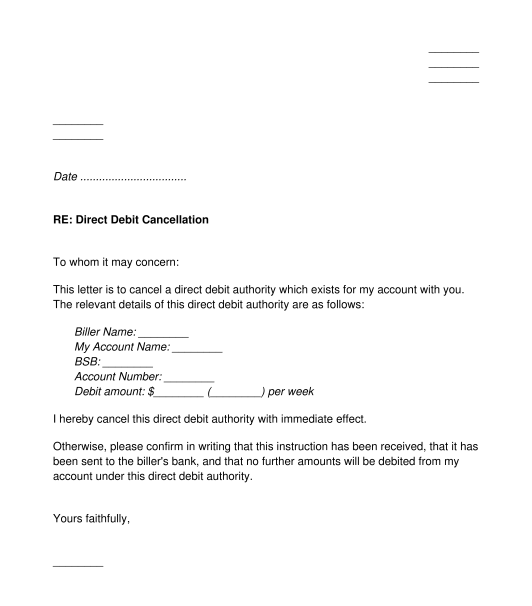 21/09/2025
21/09/2025

Answer a few questions and your document is created automatically.

Your document is ready! You will receive it in Word and PDF formats. You will be able to modify it.

 21/09/2025
21/09/2025
 Word and PDF
Word and PDF
 1 page
1 page
This is a letter to a bank or other financial institution, asking it to terminate a direct debit arrangement. The primary purpose of this letter is to give the bank the information it needs, regarding the customer and their account, and to direct the bank to stop processing the direct debits.
Direct debits are a common practice for many regular forms of payment in Australia. People use direct debits for paying utilities, rent, mortgages, gyms and other memberships and various subscriptions.
If a person wants to terminate a direct debit, then they may notify their financial institution in writing. Once the financial institution receives this request, they are obliged to ensure that no further payments are processed from the account under this direct debit arrangement. The financial institution is also required to forward your instruction to the biller's financial institution.
In addition, it is a good idea to write to the biller directly, and to instruct them to stop the direct debits. To do this, use our Letter to Service Provider to Cancel Direct Debit.
How to use this document
In this letter, the form filler will enter pertinent details about each of the parties. There is a space for the sender's name and address, as well as email (if desired) and phone number, so that the financial institution may reach the sender easily. There is also a space for the contact information of the financial institution, and optional spaces for a name and title of an individual person, if the sender knows of a specific person of whom to send the letter.
The most important portion of the letter covers information about the direct debit, such as the name of the biller, the account which is being debited, the amount and how often it is billed, along with a specific revocation of authorisation for the billing.
Once the letter has been completed, it can be sent to the financial institution. The sender may keep a copy for their own reference.
To ensure that the direct debits are stopped, the sender may also write to the biller, using our Letter to Service Provider to Cancel Direct Debit.
Applicable law
The National Consumer Credit Protection Act 2009 (Cth), and in particular the National Credit Code, which appears in schedule 1 of that Act, deals with consumer credit in Australia.
Further information and guidance can also be obtained from the Australian Securities and Investments Commission ("ASIC") and from ASIC's Moneysmart website.
How to modify the template
You fill out a form. The document is created before your eyes as you respond to the questions.
At the end, you receive it in Word and PDF formats. You can modify it and reuse it.
A guide to help you: How to Send a Letter
Letter to Bank to Cancel Direct Debit - sample template
Country: Australia